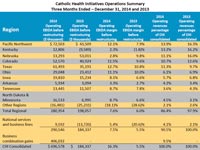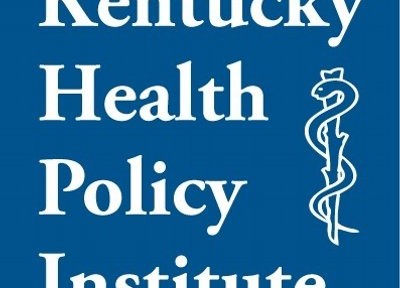 CHI’s report shows immediate favorable impact of acquisitions on current financials. Productivity and sustainability of existing operations harder to ascertain.
CHI’s report shows immediate favorable impact of acquisitions on current financials. Productivity and sustainability of existing operations harder to ascertain.
Catholic Health Initiatives (CHI), the parent company of KentuckyOne Health, released its most recent quarterly financial report earlier this month covering the three months ending December 31, 2014. The company’s press release stressed “improved second-quarter financial results as the organization continues a comprehensive program of operational improvement, revenue enhancements and strategic expansion in key markets.” Raw earnings in this second quarter were $290.5 million compared to $132.1 million in the same quarter a year earlier. Operating income moved into the black following the losses of the first quarter. These gains were attributed to “additional business acquisitions, clinical and operational improvements as well as other internal cost-saving programs to reduce expenses.” However, these “turnaround” earnings are entered before being reduced by a variety of adjustments including interest, depreciation, amortization, business combination gains, and “restructuring.” This makes it difficult for the uninitiated such as myself to judge whether this apparent reversal of fortune represents on-the-ground improvement in existing competitive markets, or the untested effects of an expanding acquisition bubble. The bond market that supports the considerable debt of the organization, and CHI’s continuing success in a rapidly changing healthcare environment will provide a more definitive judgment. The full report is available here. Continue reading “Catholic Health Initiative 2d Quarter Report Showing Better Numbers.”
Author: P Hasselbacher
Faculty Senate Meeting Updates— Or Lack Thereof!
I attended the April 1 meeting of the University of Louisville’s Faculty Senate hoping for updates in a number of areas of both faculty and community concern that we have been following. These included the politically motivated grants to the Business School, compensation packages for senior UofL executives, and Board of Trustee concerns about University governance. In all honesty, I came away disappointed.
Koch/Schnatter Foundation Grants.
Last month, Pres. James Ramsey signed linked contracts on behalf of the University and the University of Louisville Foundation accepting a potential $6.3 million dollars but which carries with them tight restrictions on the kind of thoughts allowable in the minds of recipients. Others and I found the restrictions impermissible in the academic setting but I expressed my opinion why University Administration would have no objection, indeed, no option except to accept both the money and the outside control. In accepting the grant, the University violated its own rules about requiring faculty approval before new centers or programs were applied for. In the faculty Senate meeting of March, representatives of the relevant faculty Academic Program Committee pointed out that no such approval had been requested. The Provost made much of the great value the administration placed on the input of its faculty but what else could she say? The fact is, that as of the April 1 Senate meeting, the Committee had not met to consider the matter and there was no further discussion offered from the assembly. In contrast, in his March newsletter to the community, President Ramsey makes acceptance of the grant sound like the done-deal that skeptics in the community like myself believe has occurred. Certainly there was no mention in the update of any contingency upon faculty approval. No doubt faculty other than myself are feeling steamrolled. Continue reading “Faculty Senate Meeting Updates— Or Lack Thereof!”
Why UofL Can’t Say No to the Kochs or Papa John.
A Former UofL Lobbyist’s Perspective.
A few months ago, someone anonymously sent me preliminary news reports about the University of Louisville’s engagement with politically conservative donors over the establishment of a new University Center. A fair amount has been written since about the UofL’s willingness, if not eagerness, to accept a grant from the John H. Schnatter Family to fund a new John. H. Schnatter Center for Free Enterprise within, but effectively independent of the School of Business. Insider Louisville and the Kentucky Center for Investigative Reporting have followed the matter closely. The grant itself is contingent on the University’s also accepting a grant from and sharing controlling interest with the Charles Koch Foundation. Most community concern stems from attached strings that restrict the academic viewpoints that can be addressed by the funding, and which give inordinate and inappropriate academic control to outside political and business interests. Read the Grant Contract yourself (6MB). As I lifetime member of the Academy, it made me shudder— and I am not alone. Alas, I do not think the University felt it was in a position to say no. Even as a non-University person, would you have agreed to all the provisions in this contract? If so, tell us why in your own name in the comments section. What parts of the contract do you believe are inappropriate? I don’t have enough room to do so here. Continue reading “Why UofL Can’t Say No to the Kochs or Papa John.”
Another Major Data Breach for a Health Insurer.
Hackers breached whatever firewalls and security measures were present at Premera Blue Cross based in Washington state. The personal, financial, and now even medical information of some 11 million past- and present customers were accessed. The breach may have occurred last May, was detected on January 29, but not disclosed to either the public or regulators until a few days ago. Nice job on the accountability front.
I recently wrote about an even larger breach of security at Anthem where the personal information of almost 80 million people was penetrated. It was not thought that medical information was compromised then, but how can one know for sure? I predicted we would be seeing more attacks on medical record and insurance databases but it is disappointing to see them coming on so rapidly. There are at least two driving forces or enablers. The first follows from Willie Sutton’s law explaining his reason for robbing banks—because that is where the money is. Some 18% of our gross national product fuels the healthcare industry— that is where the real money is. Medical fraud is part of that big business. Continue reading “Another Major Data Breach for a Health Insurer.”

